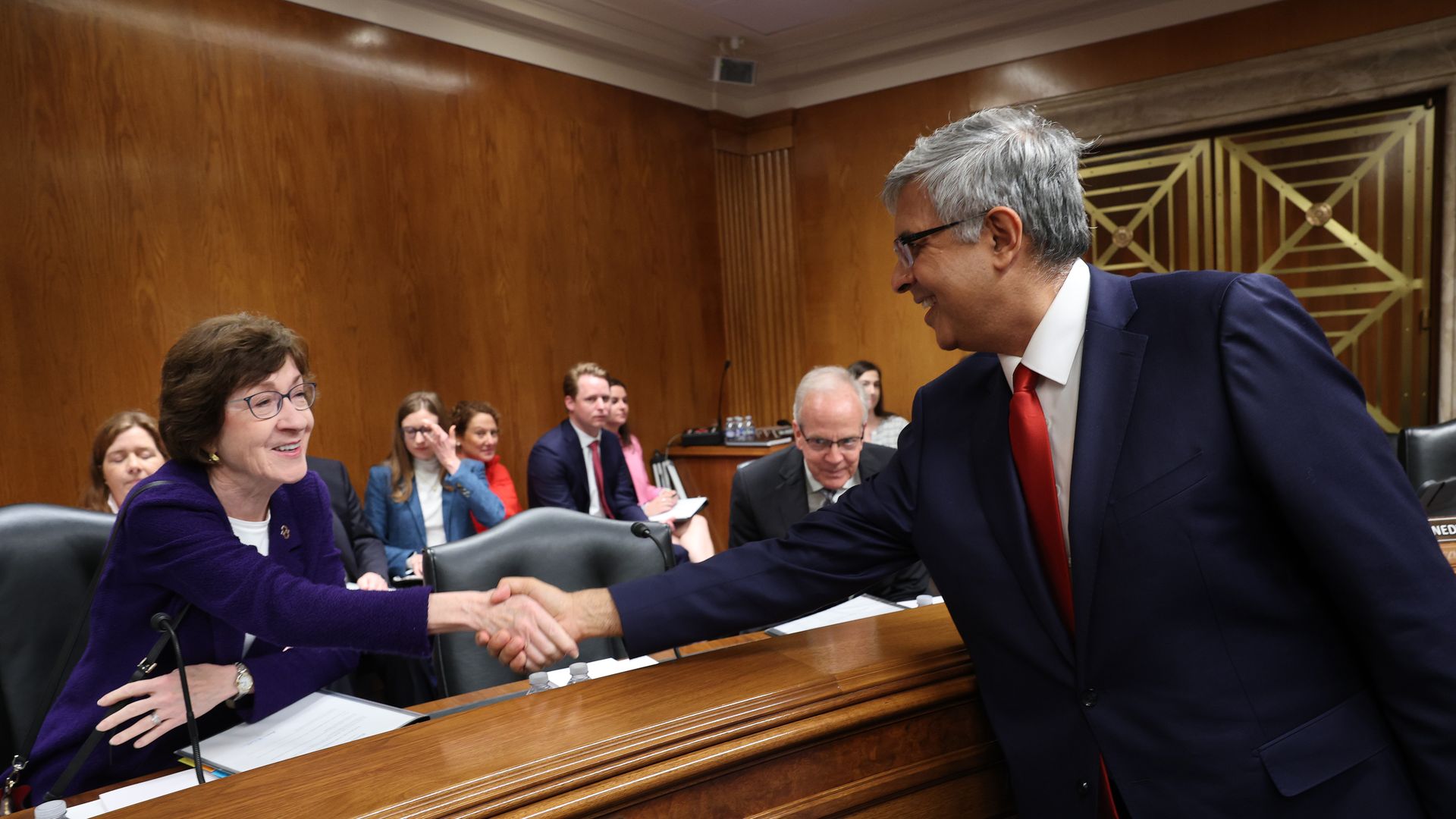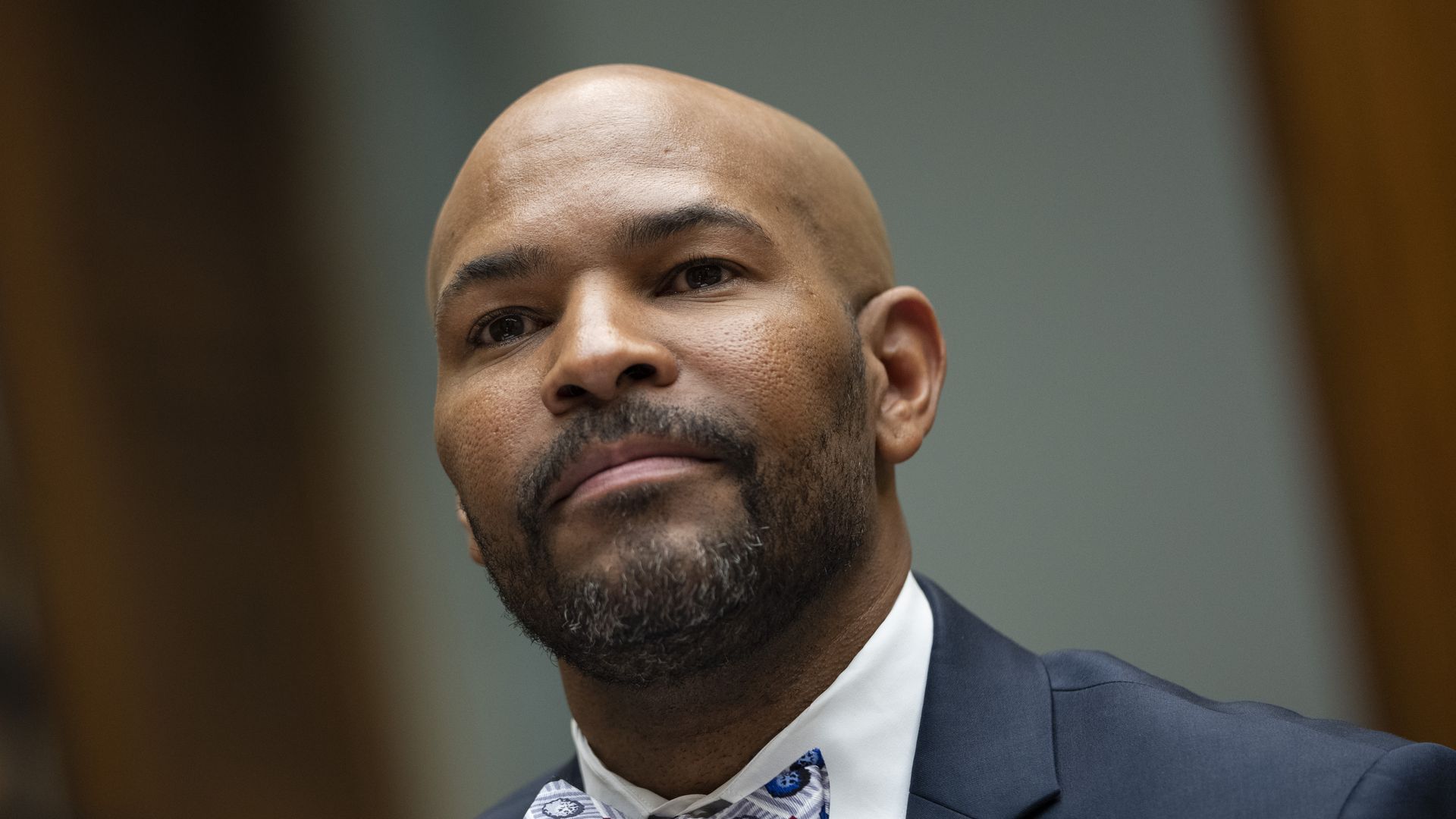|
||
| PRESENTED BY THE ALLIANCE FOR PHARMACY COMPOUNDING | ||
| Axios Vitals | ||
| By Maya Goldman and Tina Reed · Jun 16, 2025 | ||
|
Welcome to another week! Today's newsletter is 929 words or a 3.5-minute read. |
||
| 1 big thing: NIH boss sidesteps controversy | ||
| By Maya Goldman | ||

|
||
|
Bhattacharya and Sen. Susan Collins (R-Maine). Photo: Win McNamee/Getty Images |
||
|
NIH director Jay Bhattacharya didn't aggressively push back and defend Trump administration budget cuts and grant freezes when senators grilled him for 90 minutes last week about plans for his agency.
Why it matters: The former Stanford professor has tried to deflect controversy over the administration's health agenda while others on President Trump's health team under HHS Secretary Robert F. Kennedy Jr. have leaned into their roles as disruptors.
What they're saying: An HHS spokesperson told Axios that NIH and Bhattacharya are fully committed to advancing research, improving health outcomes and supporting scientific discovery. Constructive criticism pushes this innovation forward, they said. State of play: Bhattacharya tried to find a middle ground during the Senate Appropriations Committee hearing, taking credit for fighting what he called "politicized science" while telling lawmakers he didn't accept the job to terminate grants.
|
||
|
|
||
| 2. Where the 988 hotline is used most | ||
| By Alex Fitzpatrick | ||
 Data: JAMA Network Open; Map: Alex Fitzpatrick/Axios Use of the 988 national suicide prevention and mental health hotline remains uneven across states, a new analysis finds. Why it matters: The service was launched nearly three years ago to help address America's mental health crisis — but gaps persist. Driving the news: Alaska (45.3 contacts per 1,000 people), Vermont (40.2) and New York (38.8) had the highest 988 contact rates among states in 2024, per new research published in JAMA Network Open.
The big picture: The 988 service fielded more than 16.3 million calls, texts and chats between July 2022 and the end of 2024.
|
||
|
|
||
| 3. FDA cites limited resources in review delay | ||
| By Tina Reed | ||

|
||
|
Illustration: Maura Losch/Axios |
||
|
The FDA will miss a Tuesday deadline for deciding whether to approve a drug for a potentially life-threatening disorder because of "heavy workload and limited resources," manufacturer KalVista Pharmaceuticals said. Why it matters: It appears to be the first time an FDA review had to be extended because of DOGE-directed cuts to staff at the agency. The big picture: Health industries pay billions developing and shepherding drugs, devices and tests through the regulatory process, including user fees that help ensure there's enough staff to evaluate products on a predictable timeline.
KalVista said the FDA notified the company it would miss its decision date of June 17 for a new drug application for the oral drug, called sebetralstat, that targets hereditary angioedema.
What they're saying: "One delay does not a trend make," wrote Chris Meekins, a Raymond James analyst and health official in the first Trump administration. |
||
|
|
||
|
A MESSAGE FROM THE ALLIANCE FOR PHARMACY COMPOUNDING |
||
| 14 ways to cut red tape — and protect patient care | ||
|
|
||
|
Ineffective policies are limiting access to critical compounded drugs — patient-specific therapies prescribed when an FDA-approved drug is inappropriate or unavailable. What you need to know: Our Blueprint outlines 14 targeted reforms to protect patient care. |
||
| 4. Adams worried by RFK Jr.'s new precedent | ||
| By Tina Reed | ||

|
||
|
Jerome Adams. Photo: Drew Angerer/Getty Images |
||
|
President Trump's first-term surgeon general thinks people shouldn't be focused as much on who HHS Secretary Robert F. Kennedy appointed to the expert panel that advises the CDC on vaccine policy as the way he purged all 17 of the sitting members. What they are saying: "Everyone jumped so quickly from 'they fired everybody' to 'let's talk about these new people' that we stopped talking about the fact that they fired everybody," said Jerome Adams, an anesthesiologist who's now a professor at Purdue University.
Between the lines: Since the 1960s, the ACIP has served as a highly vetted advisory group that's informed the government through public debate on the safety and effectiveness of vaccines, Adams said.
"If ACIP begins dropping recommendations for COVID-19 vaccines and other shots, it would disrupt the process by which vaccines are paid for. Then you're indirectly taking away vaccine access from people," he said. |
||
|
|
||
| 5. While you were weekending | ||

|
||
|
Illustration: Natalie Peeples/Axios |
||

